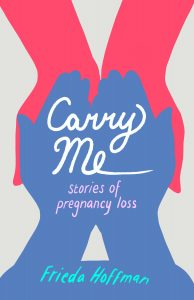Writing CARRY ME: stories of Pregnancy Loss
 When I started miscarrying, only two people besides me and my husband Joe knew about the pregnancy. A week in, I still hadn’t told anyone else besides the dozen hospital staff who’d attended to me, concerned it was an ectopic pregnancy. Not even Mom knew, more therapist/bestie these days than parent.
When I started miscarrying, only two people besides me and my husband Joe knew about the pregnancy. A week in, I still hadn’t told anyone else besides the dozen hospital staff who’d attended to me, concerned it was an ectopic pregnancy. Not even Mom knew, more therapist/bestie these days than parent.
I knew I should reach out, but I felt too dark, too heavy. I looked online for support around the ever-changing physical symptoms and was shocked at how little was out there. I didn’t want WebMD or some random lady’s rambling blog. I had no stomach for reading about God’s will or my child waiting for me in Heaven. Where were regular women with real experiences and lived wisdom?
I felt a hollowness at my core. Two months shy of thirty-nine, I’d never felt so sad or so alone in my sadness. I cancelled plans, making up excuses, and felt irresponsible for doing so, like I was somehow a slacker for having a miscarriage.
Eleven days after leaving the hospital and nine excruciating days of labor, effectively, the cramps suddenly returned.
I wailed as Joe asked me where the pain was on a scale from one to ten, a whiff of irritation in his voice. It was nearly midnight. We’d known for only four days that I’d been pregnant. The last two weeks had been a rollercoaster preceded by a years-long battle with infertility sprinkled with ambiguity about our desire for children.
The pain was an eight. No amount of ibuprofen, CBD drops, or deep breathing could quell it.
Joe massaged my back for a while, then fell asleep. I knew he was reaching his limit and felt guilty for adding onto his stress.
I woke the next morning to find my pajamas damp and red. I sighed and tossed my underwear in the trash bin, knowing I wouldn’t want the reminder of its stain.
Later that week, the gushing became a trickle and my HCG (pregnancy hormone) levels the doctors had been monitoring finally bottomed out. Then came the hospital bill–over $3000, despite having health insurance–and the slow crawl out of isolation into healing.
Even with a background in psychology and social work, I struggled to reach out to close friends and relatives. I would sit on the couch, an endless pot of steeping herbs and a stack of magazines beside me, listening to moody women croon from the speakers. Meditative walks in the leafy hills were a welcome palliative. I found myself pacing our small backyard, pulling young weeds after the rain, my core still sore and tender from the cramping.
Eventually I began opening up to friends and family, including my mother, who suddenly remembered that she, too, had suffered a miscarriage before my oldest brother was born. The more I shared, the more I understood I was not alone. The empathy came flooding in, along with a resounding chorus of “Me too” and “I’m here if you want to talk.”
But why weren’t we talking about it in the first place? Why wasn’t there a conversation or support group I could easily jump into and share my experience? Why did I and so many others know so little about pregnancy loss?
The emotions whirred around for another few months, when suddenly I found a release valve that had a greater purpose than self-soothing or catharsis. I decided to write a book to create the resource I wish I’d had around the time of my loss.
A growing number of advocates for women’s health question the so-called 12-week ‘rule’ of not announcing a pregnancy until the second trimester. Secrecy around early pregnancy means women who miscarry tend to grieve in hushed isolation, stripped of support from healthcare providers and their own social networks.
That was certainly the case for me: no aftercare, no social support. Not until I found the courage to speak up and share my story. The courage to overcome the nagging feeling that I was “only six weeks pregnant,” caving to the temptation to relativize the loss and pain, the temptation to minimize my grief because, of course, there are far more harrowing stories out there, far more suffering and trauma than I’d endured.
And yet, my loss and my grief mattered. They still matter, three and a half years later, after having chosen a childfree life. Pregnancy loss matters.
It occured to me, why had I felt so alone? It seemed so many people were coming forward with their own stories of loss. All I needed to do was say something, and others suddenly had permission to share with me. Paradoxically, many women believe they are alone and indeed suffer alone, though the experience of pregnancy loss is so widely shared.
You probably know dozens of women who have had a miscarriage and statistically half as many who struggle with infertility. You just don’t know this detail about your friend, partner, sister-in-law, favorite barista, or colleague – because we’re not talking about it. Pregnancy loss remains one of the last great taboos.
The statistic most often cited is one in four. #1in4 #ihadamiscarriage
According to some estimates, up to a third of all pregnancies end in loss when accounting for losses that go unreported or remain unknown to women because of early termination. That’s roughly three million pregnancy losses per year in the US alone, affecting not just would-be mothers, but their partners and support networks as well. Nearly everyone knows somebody affected by pregnancy loss. Yet, we’re not comfortable as a society, nor in the relative safety of friends and sisters, to discuss this serious and widely prevalent health issue.
With SCOTUS’s imminent decision to strike down Roe, it’s never felt more important to normalize the dialogue around reproductive grief and the overlapping medical forms of pregnancy release that do not end in a happy birth: miscarriage, stillbirth and abortion.
It’s time to end this silence and start supporting women.
—
CARRY ME: STORIES OF PREGNANCY LOSS
BUY HERE
 Frieda Hoffman is a transformative coach and mediator, creative consultant, and entrepreneur with a passion for supporting women and courageous leadership. As a coach, she aspires to uplift her clients and break down the barriers that keep so many from stepping into their full potential. As a writer, she aims to cultivate compassion, strength, and a greater sense of connection, particularly for and amongst women.
Frieda Hoffman is a transformative coach and mediator, creative consultant, and entrepreneur with a passion for supporting women and courageous leadership. As a coach, she aspires to uplift her clients and break down the barriers that keep so many from stepping into their full potential. As a writer, she aims to cultivate compassion, strength, and a greater sense of connection, particularly for and amongst women.
She holds an MA in social work and conflict management from Berlin’s Alice Salomon University, a dual BA in psychology and anthropology from Johns Hopkins University and is a certified Executive Coach from the UC Berkeley Haas School of Business. This is her first book. For more information, visit www.friedahoffman.com. She resides in Oakland, California.
Category: On Writing
























